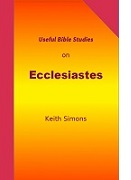Useful Bible Studies > Ecclesiastes Commentary > chapter 8
How countries become evil
Ecclesiastes 8:11
The author of Ecclesiastes was very unhappy about the legal system in his country. Wicked people had become powerful, and they were behaving in a cruel manner (Ecclesiastes 4:1-3). Poor people were suffering, but the judges were not helping them (Ecclesiastes 3:16). People could appeal to the king, but they had to appeal at the right time and in the right manner (Ecclesiastes 8:5-6). Otherwise, even the king would not help them.
The laws that God gave to Moses protect the rights of poor people (for example, see Deuteronomy chapter 24). It was the responsibility of the judges and the king to defend peopleís rights (Deuteronomy 16:18-20; Deuteronomy 17:14-20).
But people were not obeying Godís law. Instead, a rich person would pay the judges to make the decision that he wanted. Because a poor person could not pay, he had to wait. Usually the result was that the poor person never got any help. It was terrible that the judges were doing such wicked things. The delays were as bad as the wrong judgements. The judges were completely neglecting the rights of the poor people.
But it was God who gave those rights to poor people. And it was the judges who took their rights away. Their behaviour was ruining the whole country.
People saw that wicked behaviour was an easy way to become rich. So everyone who wanted to become rich started to do wrong things. They were not afraid of punishment, because they too could pay the judges.
But they were forgetting that, one day, God would be their judge. And nobody can ever pay for his kindness (Micah 6:6-8).
Next part: Is it better to be good or evil? (Ecclesiastes 8:12-13)
 Please use the links at the top of the page to find our other articles in this series. If you find these articles useful, you will like our book, available from Amazon.
Please use the links at the top of the page to find our other articles in this series. If you find these articles useful, you will like our book, available from Amazon.
You can download our articles on several Bible books, free, from our download page (including our free 1000+ page course book).
© 2019, Keith Simons.